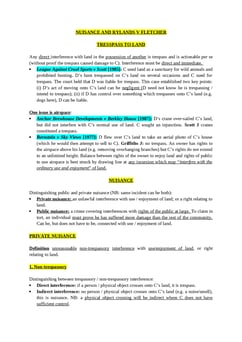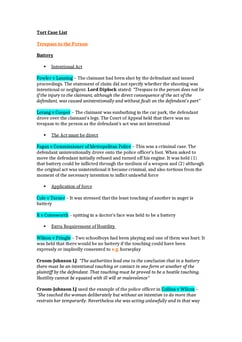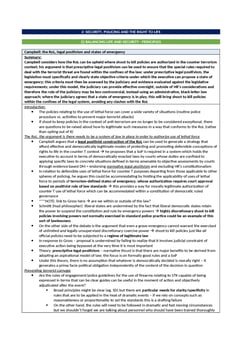Michael v Chief Constable of South Wales Police [2015] UKSC 2
Judgement for the case Michael v Chief Constable of South Wales Police
Table Of Contents
KEY POINTS
The police owe a duty of care to individuals with whom they come into contact during the course of their duty. This duty arises when a police officer assumes responsibility for an individual's safety or liberty, particularly in situations like arrests and detentions.
-
The court's rejection of the Interveners’ Liability Principle is based on several key reasons:
The principle's scope is unclear and challenging to justify, as it is not apparent why the duty should be limited to cases involving physical injury or death, or why it should apply only to specific victims while excluding others from potential liability.;
There is scepticism regarding whether imposing such a duty on police officers would genuinely enhance their performance in handling domestic violence cases. Moreover, it is deemed contrary to the public interest for police priorities to be influenced by the fear of being sued;
Implementing the Interveners’ Liability Principle could have significant financial implications for both the police force and the public.
There is no necessity to develop the law of negligence beyond what is already mandated by Articles 2 and 3 of the European Convention on Human Rights (ECHR). These articles protect individuals' rights to be free from torture, inhuman, or degrading treatment or punishment. ECHR claims serve different objectives compared to civil actions, such as negligence claims, and therefore, extending the law in this manner is not seen as warranted or necessary.
FACTS
Ms. Michael made a distress call to the Gwent Police call centre, reporting that her ex-boyfriend had physically assaulted her and threatened to kill her. The call handler relayed the information to South Wales Police but did not mention the threat to kill.
The call was graded as requiring a response within 60 minutes. Ms. Michael made another call, but the call abruptly ended after a scream.
Police arrived at her location only to discover that she had been brutally attacked and killed. The family of Ms. Michael (the "Appellants") filed a claim for damages, alleging negligence and a violation of Article 2 (right to life) of the European Convention on Human Rights under the Human Rights Act 1998.
COMMENTARY
This case clarifies the duty and standard of care owed by the police in negligence claims. It establishes that police officers do owe a duty of care to individuals they interact with, especially in situations like arrests and detentions, where they assume responsibility for the person's safety and liberty.
However, this duty is not without limitations, and the standard of care is context-specific, considering the complexities and pressures faced by police officers in carrying out their duties.
For Further Study on Michael v Chief Constable of South Wales Police

Tort Law notes fully updated for recent exams at Oxford and Cambridge. ...

A collection of the best GDL notes the director of Oxbridge Notes (an O...
Need instant answers? Our AI exam tutor is here to help.
Ask questions 🙋 Get answers 📔 It's simple 👁️👄👁️
Our AI is educated by the highest scoring students across all subjects and schools. Join hundreds of your peers today.
Get StartedSimilar Cases
Related Product Samples
These product samples contain the same concepts we cover in this case.
| GDL Tort Law | Negligence Public Authorities Notes (5 pages) |
| Criminal Justice, Security, & Human Rights | Positive Obligations Notes (59 pages) |
| Tort Law | Smith V Chief Constable Sussex Police Notes (4 pages) |

 Since 2010, Oxbridge Notes has been a trusted education marketplace, supplying high-quality materials from top achievers at universities like Oxford, Cambridge, LSE, Harvard, and Yale.
Since 2010, Oxbridge Notes has been a trusted education marketplace, supplying high-quality materials from top achievers at universities like Oxford, Cambridge, LSE, Harvard, and Yale.